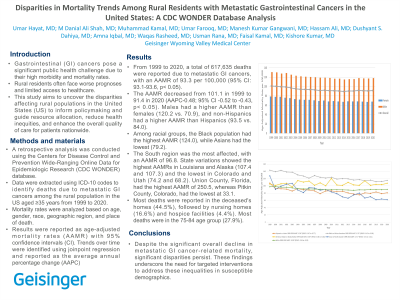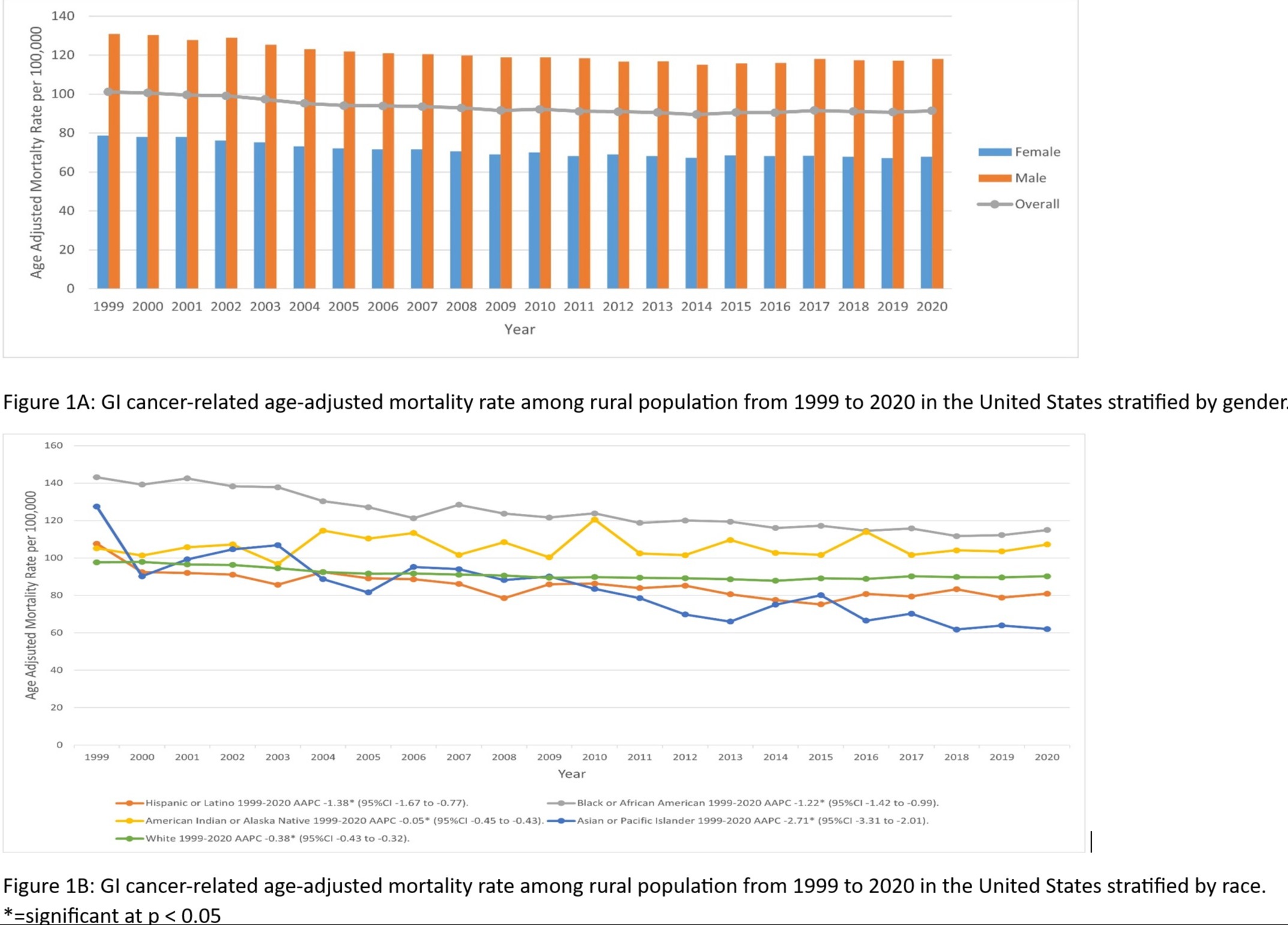Tuesday Poster Session
Category: Colorectal Cancer Prevention
P3819 - Disparities in Mortality Trends Among Rural Residents With Metastatic Gastrointestinal Cancers in the United States: A CDC WONDER Database Analysis
Tuesday, October 29, 2024
10:30 AM - 4:00 PM ET
Location: Exhibit Hall E

Has Audio

Umar Hayat, MD
Geisinger Wyoming Valley Medical Center
Wilkes-Barre, PA
Presenting Author(s)
Umar Hayat, MD1, M Danial Ali Shah, MD2, Muhammad Kamal, MD3, Umer Farooq, DM4, Manesh Kumar Gangwani, MD5, Hassam Ali, MD6, Dushyant S. Dahiya, MD7, Amna Iqbal, MD8, Waqas Rasheed, MD9, Usman I. Rana, MD10, Faisal Kamal, MD11, Kishore Kumar, MD12
1Geisinger Wyoming Valley Medical Center, Wilkes-Barre, PA; 2King Edward Medical University, Lahore, Punjab, Pakistan; 3Hackensack Meridian Health, Roselle Park, NJ; 4Saint Luke's University Hospital, St. Louis, MO; 5University of Toledo, Toledo, OH; 6ECU Health Medical Center, Greenville, NC; 7The University of Kansas School of Medicine, Kansas City, KS; 8University of Toledo Medical Center, Toledo, OH; 9University of Kentucky, Lexington, KY; 10The Wright Center for Graduate Medical Education, Scranton, PA; 11Sidney Kimmel Medical College at Thomas Jefferson University, Philadelphia, PA; 12Geisinger Community Medical Center, Scranton, PA
Introduction: Gastrointestinal (GI) cancers pose a significant public health challenge due to their high morbidity and mortality rates. Rural residents often face worse prognoses and limited access to healthcare. This study aims to uncover the disparities affecting rural populations in the United States (US) to inform policymaking and guide resource allocation, reduce health inequities, and enhance the overall quality of care for patients nationwide.
Methods: A retrospective analysis was conducted using the Centers for Disease Control and Prevention Wide-Ranging Online Data for Epidemiologic Research (CDC WONDER) database. Data were extracted using ICD-10 codes to identify deaths due to metastatic GI cancers among the rural population in the US aged ≥35 years from 1999 to 2020. Mortality rates were analyzed based on age, gender, race, geographic region, and place of death. Results were reported as age-adjusted mortality rates (AAMR) with 95% confidence intervals (CI). Trends over time were identified using joinpoint regression and reported as the average annual percentage change (AAPC).
Results: From 1999 to 2020, a total of 617,635 deaths were reported due to metastatic GI cancers, with an AAMR of 93.3 per 100,000 (95% CI: 93.1-93.6, p< 0.05). The AAMR decreased from 101.1 in 1999 to 91.4 in 2020 (AAPC -0.48; 95% CI -0.52 to -0.43, p< 0.05). Males had a higher AAMR than females (120.2 vs. 70.9), and non-Hispanics had a higher AAMR than Hispanics (93.5 vs. 84.0) Figure 1A & B. Among racial groups, the Black population had the highest AAMR (124.0), while Asians had the lowest (79.2). The South region was the most affected, with an AAMR of 96.8. State variations showed the highest AAMRs in Louisiana and Alaska (107.4 and 107.3) and the lowest in Colorado and Utah (74.2 and 68.2). Union County, Florida, had the highest AAMR of 250.5, whereas Pitkin County, Colorado, had the lowest at 33.1. Most deaths were reported in the deceased's homes (44.5%), followed by nursing homes (16.6%) and hospice facilities (4.4%). Most deaths were in the 75-84 age group (27.9%).
Discussion: Despite the significant overall decline in metastatic GI cancer-related mortality, significant disparities persist. These findings underscore the need for targeted interventions to address these inequalities in susceptible demographics.

Disclosures:
Umar Hayat, MD1, M Danial Ali Shah, MD2, Muhammad Kamal, MD3, Umer Farooq, DM4, Manesh Kumar Gangwani, MD5, Hassam Ali, MD6, Dushyant S. Dahiya, MD7, Amna Iqbal, MD8, Waqas Rasheed, MD9, Usman I. Rana, MD10, Faisal Kamal, MD11, Kishore Kumar, MD12. P3819 - Disparities in Mortality Trends Among Rural Residents With Metastatic Gastrointestinal Cancers in the United States: A CDC WONDER Database Analysis, ACG 2024 Annual Scientific Meeting Abstracts. Philadelphia, PA: American College of Gastroenterology.
1Geisinger Wyoming Valley Medical Center, Wilkes-Barre, PA; 2King Edward Medical University, Lahore, Punjab, Pakistan; 3Hackensack Meridian Health, Roselle Park, NJ; 4Saint Luke's University Hospital, St. Louis, MO; 5University of Toledo, Toledo, OH; 6ECU Health Medical Center, Greenville, NC; 7The University of Kansas School of Medicine, Kansas City, KS; 8University of Toledo Medical Center, Toledo, OH; 9University of Kentucky, Lexington, KY; 10The Wright Center for Graduate Medical Education, Scranton, PA; 11Sidney Kimmel Medical College at Thomas Jefferson University, Philadelphia, PA; 12Geisinger Community Medical Center, Scranton, PA
Introduction: Gastrointestinal (GI) cancers pose a significant public health challenge due to their high morbidity and mortality rates. Rural residents often face worse prognoses and limited access to healthcare. This study aims to uncover the disparities affecting rural populations in the United States (US) to inform policymaking and guide resource allocation, reduce health inequities, and enhance the overall quality of care for patients nationwide.
Methods: A retrospective analysis was conducted using the Centers for Disease Control and Prevention Wide-Ranging Online Data for Epidemiologic Research (CDC WONDER) database. Data were extracted using ICD-10 codes to identify deaths due to metastatic GI cancers among the rural population in the US aged ≥35 years from 1999 to 2020. Mortality rates were analyzed based on age, gender, race, geographic region, and place of death. Results were reported as age-adjusted mortality rates (AAMR) with 95% confidence intervals (CI). Trends over time were identified using joinpoint regression and reported as the average annual percentage change (AAPC).
Results: From 1999 to 2020, a total of 617,635 deaths were reported due to metastatic GI cancers, with an AAMR of 93.3 per 100,000 (95% CI: 93.1-93.6, p< 0.05). The AAMR decreased from 101.1 in 1999 to 91.4 in 2020 (AAPC -0.48; 95% CI -0.52 to -0.43, p< 0.05). Males had a higher AAMR than females (120.2 vs. 70.9), and non-Hispanics had a higher AAMR than Hispanics (93.5 vs. 84.0) Figure 1A & B. Among racial groups, the Black population had the highest AAMR (124.0), while Asians had the lowest (79.2). The South region was the most affected, with an AAMR of 96.8. State variations showed the highest AAMRs in Louisiana and Alaska (107.4 and 107.3) and the lowest in Colorado and Utah (74.2 and 68.2). Union County, Florida, had the highest AAMR of 250.5, whereas Pitkin County, Colorado, had the lowest at 33.1. Most deaths were reported in the deceased's homes (44.5%), followed by nursing homes (16.6%) and hospice facilities (4.4%). Most deaths were in the 75-84 age group (27.9%).
Discussion: Despite the significant overall decline in metastatic GI cancer-related mortality, significant disparities persist. These findings underscore the need for targeted interventions to address these inequalities in susceptible demographics.

Figure: Figure 1, A & B
Disclosures:
Umar Hayat indicated no relevant financial relationships.
M Danial Ali Shah indicated no relevant financial relationships.
Muhammad Kamal indicated no relevant financial relationships.
Umer Farooq indicated no relevant financial relationships.
Manesh Kumar Gangwani indicated no relevant financial relationships.
Hassam Ali indicated no relevant financial relationships.
Dushyant Dahiya indicated no relevant financial relationships.
Amna Iqbal indicated no relevant financial relationships.
Waqas Rasheed indicated no relevant financial relationships.
Usman Rana indicated no relevant financial relationships.
Faisal Kamal indicated no relevant financial relationships.
Kishore Kumar indicated no relevant financial relationships.
Umar Hayat, MD1, M Danial Ali Shah, MD2, Muhammad Kamal, MD3, Umer Farooq, DM4, Manesh Kumar Gangwani, MD5, Hassam Ali, MD6, Dushyant S. Dahiya, MD7, Amna Iqbal, MD8, Waqas Rasheed, MD9, Usman I. Rana, MD10, Faisal Kamal, MD11, Kishore Kumar, MD12. P3819 - Disparities in Mortality Trends Among Rural Residents With Metastatic Gastrointestinal Cancers in the United States: A CDC WONDER Database Analysis, ACG 2024 Annual Scientific Meeting Abstracts. Philadelphia, PA: American College of Gastroenterology.
